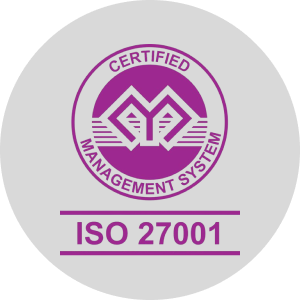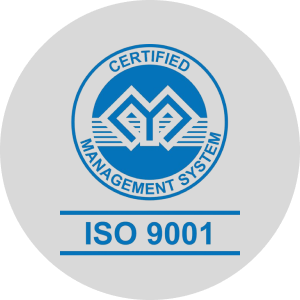
HostingB2B » ISO 27001 Accreditation
ISO 27001/27018/27701 Accreditation Demonstrating Compliance Trust & Security
ISO standards are globally recognized for information security management. We can assist you in obtaining accreditation for ISO 27001, 27018, and 27701.

Elevate Your Business with Our Rigorous Information Security Standards
Implement a Robust Approach to Information Security
Keep Your Clients’ Data Safe
Win and Retain Business
What is ISO 27001 Certification?
ISO/IEC 27001 is the international standard for Information Security Management Systems (ISMS). It outlines the requirements for managing information assets and data securely to an internationally recognized standard. This certification helps businesses protect customer and employee information, intellectual property, financial data, and third-party information.


ISO 27001 requires organizations to:
- Assess information security risks
- Implement strong security controls and processes
- Integrate information security management across the organization
SUPPORT & GUIDANCE
24/7/365 Free Premium ISO 27001/27018/27701 Certification Support
Most importantly, our round the clock Support is available for you via Live Chat, Ticket System (Email) and MS Teams.

Benefits of ISO 27001 Certification
Strengthen Data Security
Enhance your security measures to protect sensitive information.
Engage Employees
Foster a culture of security awareness and responsibility.
Refine Processes
Continuously improve your information security practices.
Secure Information Assets
Safeguard your critical data and assets.
Prepare for the Future
Build a foundation for future growth and security challenges.
Improve Your Reputation
Boost trust and credibility with clients and stakeholders.
Impress Existing Clients
Demonstrate your commitment to security.
Win More Business
Gain a competitive edge and attract new clients.


Fixed Fee Certification
Our ISO 27001 certification services come with a fixed fee, ensuring no unexpected costs. The cost is determined based on:
- Your organization’s size
- The sector you operate in
- The number of locations you manage
FAQ
Find answers to some frequently asked questions about ISO certification:
The International Organization for Standardization (ISO) publishes international standards, and ISO certification is a third-party body’s seal of approval that verifies a company’s manufacturing process, management system, service, or documentation procedures meet those standards. Depending on the exact standard met, this internationally recognized mark denotes a dedication to quality, efficiency, security, or environmental responsibility.
For example, an information security management system is certified by ISO 27001, and a quality management system is certified by ISO 9001. Obtaining ISO certification shows stakeholders, partners, and clients that a company has clear, organized procedures in place to continuously provide high standards.
Obtaining ISO certification is a methodical procedure that usually consists of four primary steps:
- Create a Management System: In accordance with the requirements of the selected ISO standard, the organization must create and record a management system (such as quality, information security, and environmental). This entails establishing processes, policies, and procedures.
- System Implementation: To guarantee that staff members comprehend and adhere to the new protocols in their day-to-day work, the management system that has been developed must be fully implemented throughout the company.
- Check for Effectiveness: To ensure that the system is functioning as planned and successfully achieving the standards’ goals, conduct management reviews and internal audits. Address any areas that need improvement or non-conformance.
- Seek Certification: Hire a recognized third-party certification organization to conduct an external audit. The company gets its ISO certificate if the audit successfully verifies compliance. In the years that follow, surveillance audits are frequently conducted.
Three of the more than 25,000 ISO standards are especially well-known and extensively used in a variety of industries:
- Quality Management System, or QMS, ISO 9001: The most widely used ISO standard, it gives businesses a framework to make sure they continuously satisfy legal and customer requirements while also improving customer satisfaction.
- Environmental sustainability is promoted by ISO 14001 (Environmental Management System, or EMS), a standard that assists businesses in methodically handling their environmental obligations.
- Information Security Management System, or ISMS, ISO/IEC 27001: This standard, which is essential for data protection, lays out requirements for creating, putting into practice, maintaining, and continuously enhancing an information security management system in light of the organization’s overall business risks.
- Information security, environmental impact, and quality are three important facets of business operations that are covered by these three standards.
The International Organization for Standardization is known by its acronym, ISO. It’s crucial to remember that “ISO” is not an acronym in the conventional sense. Instead, it comes from the Greek word “isos,” which means “equal.” The organization’s primary goal of creating global standards that promote equality and uniformity among goods, services, and systems is reflected in this decision.
An independent, non-governmental international organization, ISO brings together experts from different nations to exchange knowledge and create voluntary, consensus-based international standards that address global issues.
For companies looking to grow sustainably, increase operational effectiveness, and improve their reputation, an ISO certificate is generally thought to be worthwhile. It offers a methodical framework for process optimization, which boosts output, cuts waste, and improves resource use. ISO 9001, for example, contributes to consistent product/service quality, which raises customer satisfaction.
Additionally, since many businesses demand that their partners or suppliers be ISO certified, ISO certification greatly increases a company’s professionalism and credibility while also opening doors to new markets. It is a strategic asset for a well-run business because it also helps with risk reduction, legal and regulatory compliance, and even lower insurance premiums.
Many people believe that certificates are issued by the International Organization for Standardization (ISO). In actuality, ISO does not conduct certification audits; instead, they create and publish the standards. Rather, independent third-party Certification Bodies (CBs), commonly referred to as registrars, are responsible for awarding ISO certifications.
To confirm that an organization’s management system satisfies the precise requirements of a given ISO standard, these Certification Bodies carry out thorough audits. These Certification Bodies are themselves accredited by national or international accrediting organizations (such as UKAS in the UK and ANAB in the US) that adhere to ISO standards in order to guarantee their legitimacy and objectivity.
There isn’t a single “best” ISO certification because the best one for your company depends on its industry, objectives, and particular requirements. Every ISO standard covers a distinct facet of operations or management.
- Quality management, or ISO 9001, is ideal for businesses that are committed to continuously satisfying client needs and raising customer satisfaction.
- Organizations that handle sensitive data and must systematically protect information assets are best served by ISO 27001 (Information Security Management). vital for hosting companies such as HostingB2B.
- The best option for businesses looking to control and lessen their environmental impact is ISO 14001 (Environmental Management).
- For businesses that prioritize workplace safety and reducing occupational hazards, ISO 45001 (Occupational Health & Safety) is the best option.
The certification that most closely matches your company’s goals and enables you to make measurable progress is the “best” one.
Seven core principles form the foundation of the ISO 9001 standard for quality management systems:
- Focus on the customer: Fulfilling their needs and working to go above and beyond their expectations.
- Leadership: Leaders foster a sense of direction and unity while fostering an atmosphere that enables individuals to meet the organization’s quality goals.
- Engagement of People: To increase the organization’s ability to generate value, competent, empowered, and engaged individuals at all levels are crucial.
- Process Approach: When tasks are viewed and handled as interconnected processes, consistent and predictable outcomes can be obtained more successfully.
- Improvement: An organization must constantly improve in order to sustain present performance levels, respond to shifts, and seize new opportunities.
- Evidence-Based Decision Making: Choices that are supported by data and information analysis and evaluation have a higher chance of yielding the intended outcomes.
- Relationship Management: An organization must manage its relationships with pertinent interested parties, like suppliers, in order to succeed over the long term.
ISO 9001 is a widely used and significant example of an ISO standard. This standard offers a structure for the Quality Management System (QMS) of an organization. It lays out the requirements for a QMS, assisting companies in making sure they continuously deliver goods and services that satisfy both legal and customer demands.
An organization with ISO 9001 certification has strong procedures in place for customer satisfaction, quality control, ongoing development, and efficient management. It certifies the management system used to create and provide a particular product or service, not the quality of the product or service itself. Because the concepts of quality management are generally advantageous, it is therefore extremely relevant for service providers such as HostingB2B, even if they are not directly ISO 9001 certified.
The global economy and individual companies both gain from ISO standards for a number of vital reasons. They offer a globally accepted framework for best practices, guaranteeing uniformity, excellence, security, and effectiveness in a range of global industries. ISO standards help companies optimize processes, cut waste, boost operational effectiveness, and improve the quality of their goods and services.
Additionally, ISO certification helps navigate complicated legal and regulatory environments, opens up new markets (since many partners and tenders require it), and greatly increases international credibility. In the end, ISO standards assist organizations in lowering risks, raising customer satisfaction, and developing a more robust, competitive brand reputation by encouraging a culture of continuous improvement and evidence-based decision-making.
Powering the Web: Our Latest Articles
How To: Unlock the Power of Web Solutions

SSL Certificate Renewal (DNS Re-Issue Required)

How to Host Your Platform in Malta with Zero Downtime Migration

How to Migrate to a Compliance-Ready Dedicated Server with Zero Downtime

- Stratigou Timagia Avenue 18, Omega Business Center 2nd Floor, 6047, Larnaca/Cyprus
- +357 24 205888
- admin[at]hostingb2b.com
- sales[at]hostingb2b.com
HOSTING
SOLUTIONS


Security
Application Hosting
Solutions as a Service
Networking
Datacenter & Network Information
Company Blog
Legal
Company Info
- About Us
- Certification & Awards
- Investor Relations
- Contact Us
Careers & Affiliates
Contact Info
- +357 24 205888
- admin[at]hostingb2b.com
- sales[at]hostingb2b.com




"Their dedication to ensuring customer satisfaction is evident. Its comforting to know that there's an responsive support team available, for assistance. Without hesitation I highly recommend Hosting B2B Cyprus for their service well as the exceptional support offered by George Sarris. Thank you for making our hosting experience a positive one."
"I have used these chaps for about a year now, and their response times and knowledge of their services is really excellent. The most recent time I needed to contact them was around adding in a temporary server just for a few days - they were so helpful and quick to respond. Just what I wish so many other companies would do (take note, AWS!!!)"
"Great company! It was especially pleasant to work services sales, who made every effort to get everything we needed on time and get a positive result in the end. Not everything went smoothly at the beginning, but Marina S. did her best to solve the initial problems. After a few months, I can say that I'm definitely satisfied."